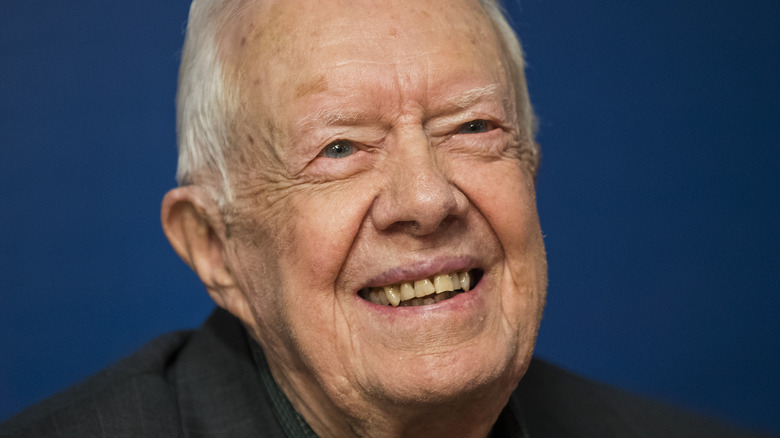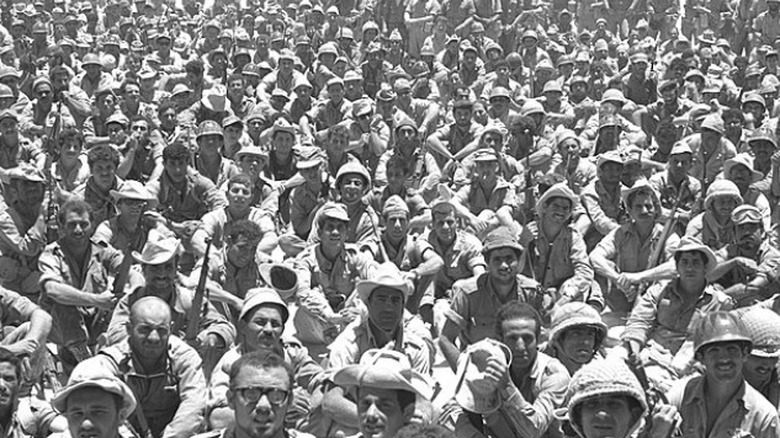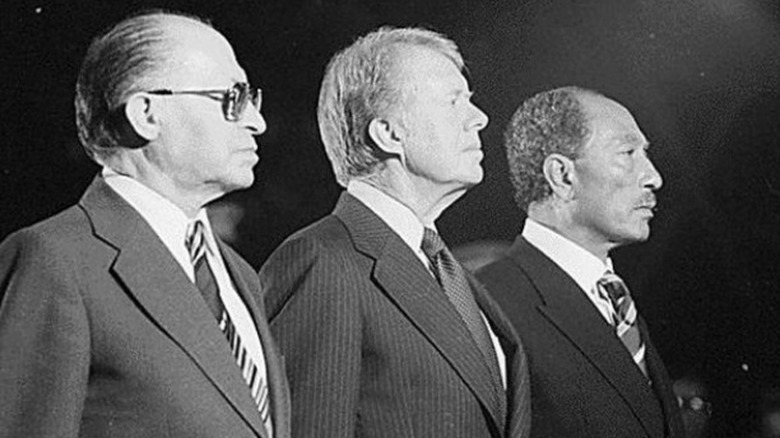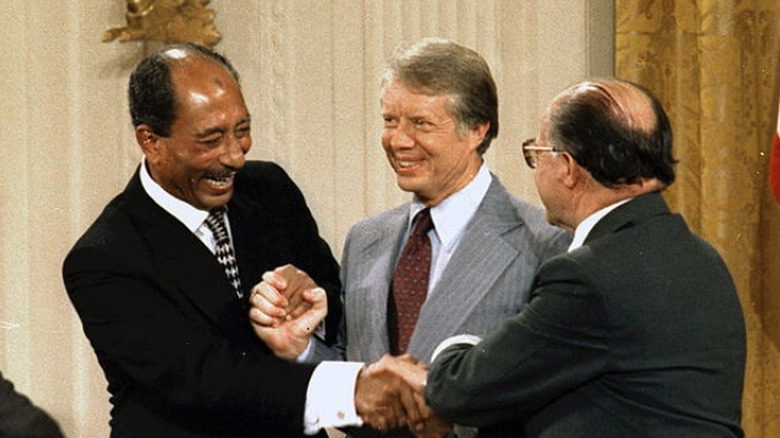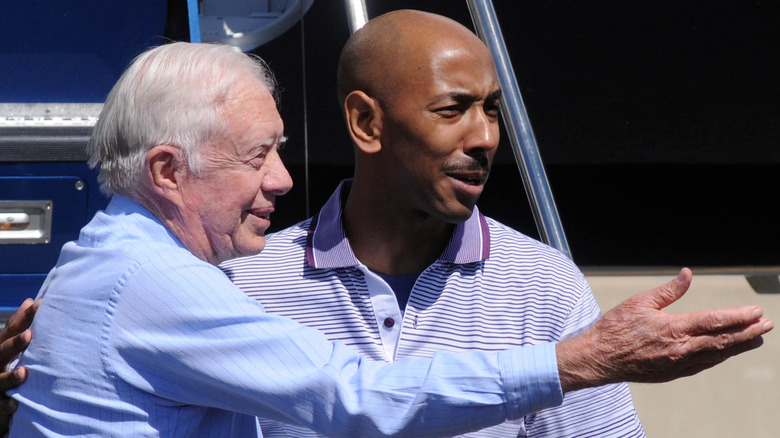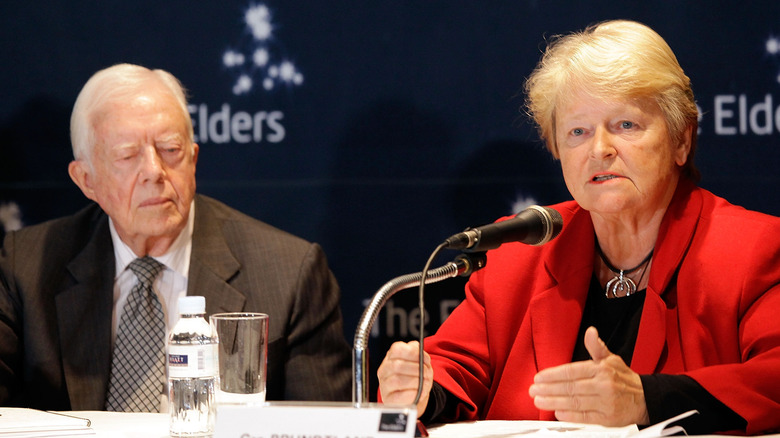Jimmy Carter's Legacy Is One Of Peace, In And Out Of The White House
The 39th U.S. President Jimmy Carter, who entered hospice care in February 2023 at the age of 98, served only one term in The White House. Still, he will be remembered for several major diplomatic achievements, accomplished both while he was in office and as a private citizen. The first took place in 1978 when as president, Carter played an active part in brokering peace between two long-feuding Middle Eastern countries (via History).
Then in the 1990s, Carter became the first former American president to travel to North Korea, where he laid the framework for an arms deal with North Korea's repressive government. Carter would return to North Korea two more times, each visit helping take steps toward normalized relations between North and South Korea, as well as between North Korea and the U.S. (via the Associated Press). International diplomacy, such as what Carter is known for, is no easy task. Carter excelled in this area, and though more work remains, the effort Carter made toward international peace will be an enduring part of his legacy.
The Israeli-Egyptian conflict began in the 1940s
Jimmy Carter took office in 1977, and one of the most pressing international conflicts at that time was between Israel and Egypt. Tensions between the two nations first erupted in the late 1940s when the country of Israel was created. These stressors boiled over to armed conflict on several occasions, such as the Six-Day War in 1948-49 and the Yom Kippur War in the 1970s before Carter was elected (via Britannica). As far as foreign affairs, Carter prioritized improving relations between Israel and Egypt almost immediately after he took office.
At that time, Israel was led by Prime Minister Menachem Begin and Egypt by President Anwar el-Sadat. At first, Carter aimed to bring the entire Middle East region, as well as the Soviet Union to the table. Though it was soon clear that Begin and Sadat preferred to deal directly with each other. Early on, thanks in part to Carter's encouragement, Sadat was the first Egyptian leader to visit Israel, and likewise, Begin traveled to Egypt. Despite that fact, lasting peace between the two countries — not to mention the entire Middle East region — remained elusive.
While president, Carter called a summit between the two countries
With a peaceful resolution between Egypt and Israel still out of reach, in 1978, Carter invited both the Egyptian leader, Menachem Begin, and Egyptian President Sadat to a summit Carter arranged at Camp David. And though the going was rough, that summit resulted in the Camp David Accords, with Carter himself an active participant in their negotiations. Under that agreement, Israel would withdraw from the Sinai peninsula it had held since the late 1940s, and full diplomatic relations between the two countries were established. There was also an agreement on Israel's part to allow Palestinian self-governance in Gaza and the West Bank.
The Camp David Accords earned Begin and Sadat a Nobel Peace Prize that year. Carter himself won the Nobel Peace Prize in 2002 for his work on the Camp David Accords, among other achievements (via the Nobel Prize website). Though the Camp David Accords were a step in the right direction, more work remained to establish lasting peace. The next significant milestone in Carter's involvement in resolving Middle East tensions came one year later.
Egypt and Israel signed a peace treaty in 1979
Despite the achievement of the Camp David Accords, there were persistent problems between Israel and Egypt and elsewhere in the Middle East region. In 1979, a peace treaty was finally signed between the two countries, which, though flawed, still stands to this day. As is often the case with diplomatic negotiation, one step forward is sometimes accompanied by two steps back, and progress is rarely linear and never without compromise.
The treaty signed between Egypt and Israel helped bring some peace to the region, but the Palestinian people were not represented at the negotiating table, and fallout in part from Sadat's willingness to enter a peace deal with Israel, brokered by the U.S., played a part in his 1981 assassination by Islamic extremists. Nonetheless, Carter's hard work and focus on peace in the Middle East, and the ground those efforts gained is a significant part of how former President Carter will be remembered.
On that note, Princeton professor and former U.S. ambassador Daniel C. Kurtzer told History, "One of Carter's achievements is that he was smart enough ... and agile enough to support what Sadat and Begin were doing in essentially a bilateral process."
Post-presidency, Carter met with North Korea's leader
The next major goal Carter accomplished in brokering international peace came in 1994, when he became the first U.S. president to visit and negotiate with the North Korean communist government. In doing so, Carter met with North Korean leader Kim Il Sung to help relieve simmering military tension in the region with a nuclear disarmament agreement, known as the "Agreed Framework," entered into by North Korea in exchange for U.S. aid. reaping benefits for all those involved for many years afterward.
That was just the first of three diplomatic missions Carter would embark on in his lifetime. The next one came in 2010, when Aijalon Gomes, an American citizen imprisoned in North Korea and sentenced to eight years of hard labor and fined $700,000 for illegally entering the country. At that time, Carter successfully brokered a deal, and Gomes (pictured with Carter above) returned home safely, The New York Times reports. The next and final visit Carter made to North Korea happened shortly after.
Carter returned to North Korea to address a food shortages
Though he would offer to return one final time to North Korea in 2019, per Politico, the final diplomatic peace mission undertaken by Jimmy Carter was in 2011 when the former president visited the North Korean capital Pyongyang with a so-called "delegation of Elders," or former leaders, like Carter, from Western countries (pictured above). At that time, Carter and his delegation were there to discuss a food shortage in North Korea and to revisit talks on nuclear disarmament.
On his three visits to North Korea in his lifetime and on the ongoing tensions between the U.S. and North Korea, in 2017, Carter wrote on The Carter Center website, "I have visited North Korea three times, and have spent more than 20 hours in discussions with their political leaders regarding important issues that affect U.S.-DPRK relations," DPRK referring to the Democratic People's Republic of Korea, the official name of North Korea's government.
Carter added, "During all these visits, the North Koreans emphasized that they wanted peaceful relations with the United States and their neighbors ... A commitment to peace by the United States and North Korea is crucial." Though no political record is perfect, Rutgers University professor David Greenberg said this on Carter's legacy (via Rutgers University), "Carter will be remembered, I think, as a man with good impulses ... He tried to put human rights at the center of foreign policy."
